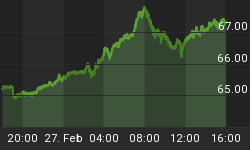MarketWatch should be ashamed of itself. In a July 24, 2014, interview, Mephistopheles was treated with the respect due a senior statesman, when he should have been asked: "Have you no sense of decency sir, at long last? Have you left no sense of decency?"
The answer, of course, is "no," though Greenspan does not understand that.
Left on our own, some comments MarketWatch should have mutilated. Greenspan is quoted in italics:
"[N] o central bank can be oblivious to what is happening, not only in credit markets, which is, of course, the Fed's fundamental mandate...."
Greenspan did not state just what the Fed's mandate concerning credit might be. Of course, he wanted to leave MarketWatch readers with the impression that prudence is paramount, and that "The Greatest Central Banker who Ever Lived" (Alan Blinder, Princeton economics professor; Federal Reserve, rag-sheet propagandist), established the industry standard. From the time Greenspan was named Federal Reserve chairman until he left office, the nation's debt rose from $10.8 billion to $41.0 billion. It had risen to a level at which it was unserviceable.
"Without asset-market surveillance, you do not have an integrated view of how the economy works."
Chairman Greenspan would not allow the FOMC to discuss asset prices. By the mid- to late-1990s, there were many FOMC members who raised the topic of runaway asset prices, including stocks, houses, booming housing debt that was boosting those prices, and out-of-control consumer spending. The most persistent critic was Jerry Jordan, president of the Cleveland Fed.
At the December 16, 1997 FOMC meeting, Jordan said: "Some Board members referred earlier to the dichotomy between the prices of services and the price of goods. That clearly is the case, but the notion of dichotomy also has to be applied in the case of asset prices....I was reading some material about the operations of the FOMC in the early 1930s." That material has been annihilated by the so-called academics.
Jordan concluded, the Fed's myopic concentration in the 1920s on a steady price level of goods and services was wrong: "I think it's a useful reminder of what can go wrong if we are too narrow in thinking about the words 'inflation' and 'deflation'....What do we mean by the word 'inflation?' Clearly, it cannot refer simply to the current price of goods..."
Greenspan ignored Jordan's observation. Later in the meeting, Greenspan thought that "[s]omething very different is happening.... [W]e keep getting reams of ever lower CPI readings that seem outrageous in the context of clearly accelerating wages and an ever-tighter labor market...I was startled by this morning's CPI report. We cannot keep getting such numbers and continue to say that inflation is about to rise." Jordan had just told Greenspan that inflation was out of control: it was Microsoft rather than Mayonnaise that was inflating.
"How to respond to asset-price change is a legitimate issue. But not to monitor it, I think, is clearly a mistake."
In 1998, Chairman Greenspan told the FOMC, in effect, there would be no further discussion about rising asset prices. He declared asset prices could no longer be mentioned at meetings: "I have concluded that in the broader sense we have to stay with our fundamental central bank goal, namely to stabilize product price levels."
In fact, excesses outside the Eccles Building were not dissimilar to those today. Jerry Jordan, at a 1998 FOMC meeting: "Bankers complain a lot that pension funds and insurance companies are doing deals that no sensible banker would be willing to consider."
Greenspan's rationale was nonsense: "I do know that the presumption we have discussed in the last year or so that we can effectively manage a bubble is probably based on a lack of humility. As I've said before, a bubble is perceivable only in retrospect." My italics.
Greenspan had never said "a bubble is only", etc., anywhere, to any audience. His declaration was accepted immediately. The mental incapacity of this generation of economists is evident in the fact this position would become known as the "Greenspan Doctrine," and accepted by central banks, academic economists, and the media.
Okay, let's end with a laugh. Alan Greenspan in a commencement address (institution withheld to spare humiliation) on May 15, 2005: "I do not deny that many appear to have succeeded in a material way by cutting corners and manipulating associates, both in their professional and personal lives. But material success is possible in this world, and far more satisfying, when it comes without exploiting others. The true measure of a career is to be content, even proud, that you succeeded through your own endeavors without leaving a trail of casualties in your wake."
Frederick Sheehan writes a blog at www.aucontrarian.com
















